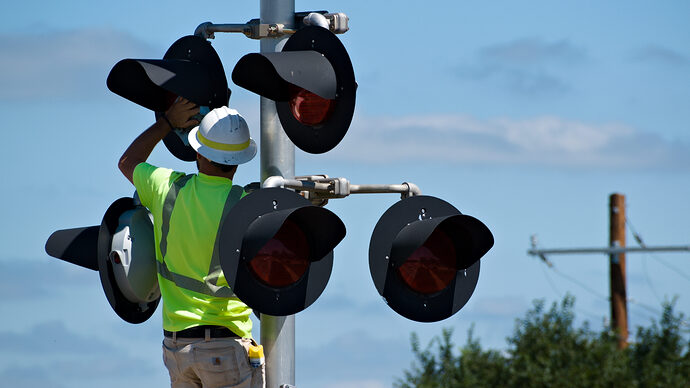Another rail union rejects tentative labor agreement
Roughly 61% of Brotherhood of Railroad Signalmen’s voting members oppose deal intended to head off strike
October 26, 2022
A majority of members of the Brotherhood of Railroad Signalmen voted against ratifying the labor agreement. (Photo: Shutterstock/Antho B)
Count the Brotherhood of Railroad Signalmen (BRS) as another union to reject the tentative labor agreement that representatives of the rail unions and the freight railroads negotiated under pressure from the White House.
The union and the organization representing the railroads plan to return to the negotiating table, but BRS’ vote further clouds the question of whether a freight rail strike could occur — something that the tentative agreement had sought to stave off. Members of the Brotherhood of Maintenance of Way Employes Division rejected that union’s tentative agreement earlier this month.
BRS announced Wednesday that 60.57% of voting members opposed ratification, while 39.23% voted in favor.
BRS represents more than 6,000 members affected by the negotiations, which is about 5% of the 115,000 union members involved in the negotiations process.
BRS President Michael Baldwin said the percentage of members who voted — 73.18% — was the highest participation rate in BRS history.
The union was represented at the negotiating table by the Coordinated Bargaining Coalition and later by the United Rail Unions. The National Carriers Conference Committee (NCCC) represented the freight railroads.
In response to BRS’ vote, NCCC said it was “disappointed” in the outcome, saying that the failure to ratify the agreement would delay the benefits of the tentative agreement for BRS members.
Both NCCC and BRS have agreed to maintain the status quo until early December, which means any potential service disruptions by BRS members would not occur before then. Both parties will be going back to the bargaining table for further contract negotiations.
NCCC says the tentative agreement includes recommendations by the Presidential Emergency Board (PEB), a three-person independent group appointed by President Joe Biden over the summer to work with the railroads and the unions on finding ways to resolve the labor contract impasse and avert a strike. The railroads and unions have been negotiating a new contract since January 2020.
Those recommendations included the largest wage increase in nearly five decades, maintained rail employees’ platinum-level health benefits and added an extra day of paid time off, NCCC said, noting that six other unions had already voted in favor of ratifying their labor agreements.
NCCC said PEB’s recommendations “represent a carefully considered compromise of all parties’ interests.”
“BRS asserts that the tentative agreement is inadequate because it does not provide for additional paid sick time. However, the vast majority of BRS members work predictable schedules and all have access to time off,” NCCC said. “Like other rail employees, they can and do take time off for sickness and already have paid sickness benefits beginning after four days of illness-related absence and extending for up to a year.
“The structure of these benefits is a function of decades of bargaining where the unions have repeatedly agreed that short-term absences would be unpaid in favor of higher compensation for days worked and more generous sickness benefits for longer absences,” NCCC continued. “The three experienced arbitrators appointed to PEB 250 by President Biden thoroughly reviewed and rejected a union proposal to add paid sick time for short-term absences to the existing system, noting in their report that union concerns had been considered in formulating the PEB’s historic wage recommendation.”
But BRS said the vote “spoke loudly and clearly that their contributions are worth more.”
“I have expressed my disappointment throughout the process in the lack of good-faith bargaining on the part of the NCCC, as well as the part PEB 250 played in denying BRS members the basic right of paid time off for illness,” Baldwin said in a statement. “The NCCC and PEB also both failed to recognize the safety-sensitive and highly stressful job BRS members perform each day to keep the railroad running and supply chain flowing.
“Without Signalmen, the roadways and railroad crossings would be unsafe for the traveling public, and they shoulder that heavy burden each day. Additionally, the highest offices at each Carrier, as well as their stockholders, seem to forget that the rank-and-file of their employees continued to perform their job each day through an unprecedented pandemic, while the executives worked from home to keep their families safe.”
The six unions that have approved their agreements are the American Train Dispatchers Association, the International Brotherhood of Electrical Workers, the Transportation Communications Union, the Brotherhood of Railway Carmen, the National Conference of Firemen & Oilers, and the mechanical and engineering division of the International Association of Sheet Metal, Air, Rail and Transportation (SMART) Workers.
Two of the largest unions representing train engineers and conductors — the Brotherhood of Locomotive Engineers and Trainmen and SMART-Transportation Division — have yet to vote on whether to ratify their agreements.
